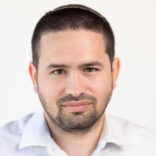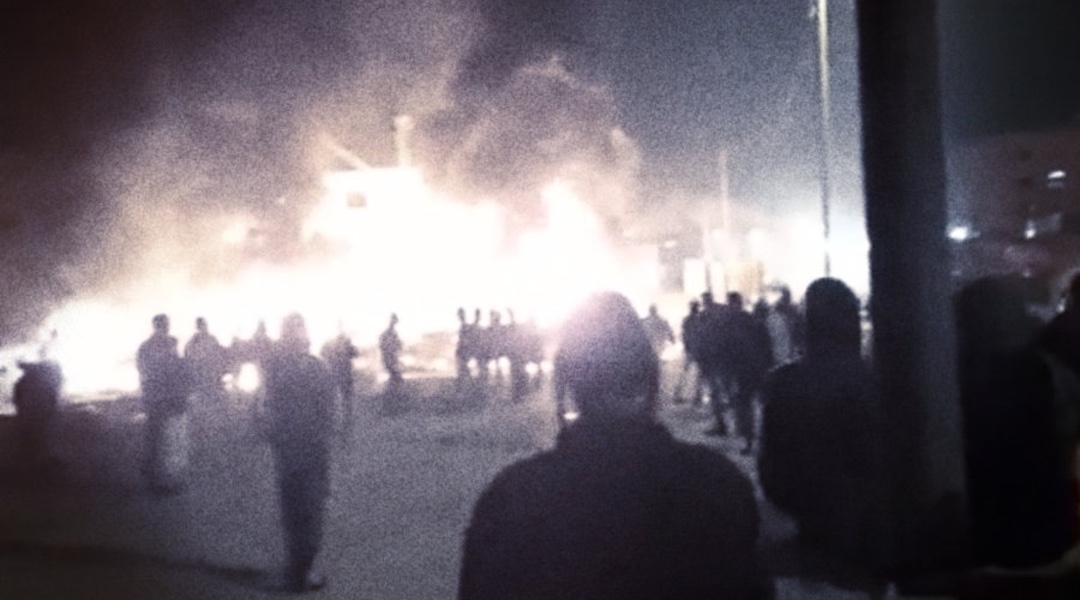(JTA) — Nighttime in Huwara, a small Palestinian town in the West Bank. Jews in large skullcaps and sidelocks, prayer fringes dangling from their waists, responding loudly to the cantor: “Yehei shmei raba mevurach leolam u’leolmei olmaya” (“May His great name be blessed, forever and ever”) — the words of Kaddish, a regular daily prayer that can also be said to mourn the dead.
The gloom outside is illuminated by an enormous bonfire of cars, shops and homes belonging to the Palestinian residents of the village, which the Kaddish-reciters have set on fire, in revenge for the horrific and heartrending murders, hours before the pogrom, of brothers Hillel and Yagel Yaniv (may their memory be a blessing) and for other recent terror attacks in the area.
One Palestinian was killed during the rioting by these Jewish settlers. Dozens of wounded Palestinians were evacuated to hospitals, some from smoke inhalation, others from beatings and stabbings. A family was evacuated by IDF troops, moments before they might have perished in the flames that took their home.
This wasn’t just any Kaddish, yet another one of those said and repeated by any observant Jew multiple times a day, sometimes in mumbling fashion. This time it was a Kaddish for Judaism itself.
I grew up in a small town in central Israel, in a classic “dati leumi” or national religious community whose ideology combines Zionism and Orthodox Judaism. I studied in typical religious institutions: a school in the state-religious education stream, a high school yeshiva and a “hesder yeshiva,” which combines advanced religious studies with military service. I was also very active in the religious Zionist Bnei Akiva youth movement, as an educator and leader.
Even today I live in a religious community in Jerusalem, and my young children study in schools that belong to the state-religious education stream.
The Judaism that I know and by which I try to live is a Judaism that operates according to the commandment “walk in His ways” (Deuteronomy 11:22) and the Talmud: “As He is gracious you should also be gracious, as He is compassionate you should also be compassionate” (Shabbat 133b:4-6). This Judaism operates according to the verse from Leviticus, “The land shall not be sold permanently, for the land belongs to Me, for you are strangers and [temporary] residents with Me.”
By contrast, the Judaism that the militant settlers imbibed — or distorted — led one of the pogromchiks, he too in skullcap and sidelocks, to speak in Hebrew words I understood but whose language I could not not comprehend. “There is something very moving here,” he told a reporter. “Jews won’t be silent. What the army can’t do, what the police will never do, simple Jews come and carry out a simple act of vengeance, setting fire to anything they can.”
The same Judaism led Davidi Ben Zion, deputy head of the Samaria Regional Council, also an observant Jew, to say blithely, shortly before the pogrom, that “Huwara should be wiped off the earth — no room for mercy,” and “the [Jewish] guys in Huwara right now are behaving precisely like guys whose brothers were massacred in cold blood at point-blank. The idea that a Jew in Samaria is a diasporic Jew who will be stabbed in the heart and politely say thank you, is childish naivete.”
That same Judaism led Israel’s finance minister, Betzalel Smotrich, the de facto governor of the West Bank, to publicly support a tweet by another coalition member calling to “wipe out” the village.
In the name of this Judaism, denizens of hills and outposts abuse the Palestinians daily, with the aid or under the blind eye of the IDF. A national Jewish settlement endeavor has been taking place for two generations now, which despite the good intentions of some of its practitioners, has included land theft, institutionalized discrimination, killing and hatred. An endeavor under which the current coalition, the most observant ever, only grows and intensifies.
In ordinary times life is not black and white. The Palestinian side also has a significant part in the story. The violence comes in great force and cruelty from there as well, and its many victims and circles burn the soul and draw many good people into the cycle of vengeance. The solution, too, is complex and hard to see, even far off on the horizon. But there are moments when things are actually very clear, clarifying the gray areas, when the choices are between life and death, and good and evil.
This evil version of Judaism is a lethal drug, which through a historical twist of fate gained ascendance over our ancient tradition. Combined with nationalism and majority hegemony in the Land of Israel, it has become a conflagration, one that has long since spread beyond religious Zionism — what Americans might refer to as “Modern Orthodox” — to the haredi, or ultra-Orthodox sector, and Israeli society in general.
An entire generation of Jews has been raised on this Judaism of hate, contemptuous of anyone who is not Jewish, of any display of weakness, of compassion. To whom Judaism is not the keeping and continuation of our tradition, observing commandments or studying Torah, but a worship of “Jewish might” (“Otzma Yehudit,” the name of a far-right political party) and limitless greed. In this Judaism, traditional values like modesty, pity and charity are signs of weakness, or remnants of a pathetic and feeble Christian morality that under no circumstances are to be shown to a stranger, the other, those who are not like us.
What we need now is not accommodation, nor soft words and platitudes. Neither will an obvious and empty condemnation of the pogrom do a bit of good. What we need now — having seen the elected officials who represent this religious population, having witnessed their nationalist Judaism — is a policy rooted in a tradition they abandoned. We should treat those who distort Judaism as the Mishnah tells us to treat all evildoers: “Distance yourself from an evil neighbor, and do not cleave to a wicked person” (Ethics of the Fathers 1:7). We need to announce that we want no part in the feral growth that has sprung up here, that this is not the tradition we grew up on, this is not the Torah we studied, and this is not how we wish to live our lives and raise our children.
Let us return to tradition and start over.
JTA has documented Jewish history in real-time for over a century. Keep our journalism strong by joining us in supporting independent, award-winning reporting.







